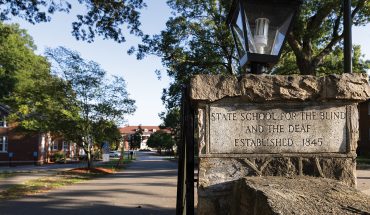N.C. State’s Kevin Keatts
Tested, unflappable
by Henry Gargan
portraits by Ben McKeown
When N.C. State went looking for a men’s head basketball coach to replace the ousted Mark Gottfried at the end of last season, the university knew what it needed: someone proven in his ability to make something out of very little, someone able to withstand the pressures of college basketball’s most fearsome conference, and someone young enough to have little to lose by trying. They found it in Kevin Keatts, 45.
The former UNC-Wilmington coach is as tested, unflappable, and fresh as they come. Since March, he has been hard at work molding a program out of the pieces left by Gottfried – and a few he brought over himself from down east. “I want to be able to win games, but I want to make our fan base proud,” Keatts says. “My job is to get the program right back where it was.”
Past glory is not a distant memory for Wolfpack fans, who cheered their team on to four straight NCAA Tournament appearances before suffering through the last two seasons, which saw the Wolfpack log just nine ACC game wins.
Keatts has proven he knows what to do with a team that’s seen better days. The UNC-Wilmington Seahawks were a bottom-of-the-conference team who hadn’t been to the Big Dance in a decade when Keatts arrived there in 2013. A year later, the young coach took them to the NCAA Tournament, and he did it again last March.
To be sure, some observers question whether Keatts, as young as he is, can make the adjustment to coaching in the ACC, where blue-chip players tend to exhibit the kind of athleticism and size that can turn Naismith’s game into a sort of above-the-rim volleyball.
But assistant coach Takayo Siddle and Wilmington transfer C.J. Bryce, both of whom played under Keatts, say N.C. State’s new coach will bring the same skills to the Wolfpack that he used to transform teams at UNC-Wilmington and Hargrave Military Academy.
“He hasn’t changed at all,” says Bryce, who is sitting out this season due to NCAA transfer rules. “He’s doing everything the same, and I think that’s going to be a major key to success. How can you go wrong keeping that same winning game plan?”
In some ways, this is a good time for a young coach like Keatts to take over a struggling program. Expectations are low for this year’s team, to put it mildly. Cobbling together a functional roster over the summer, with the help of four last-minute transfer students, was a minor victory. Now there’s not room for much besides improvement.
It also doesn’t hurt that the football program is having one of its better years in recent memory. If that team can make good on its hot start, Wolfpack fans will at least be in a good mood when Keatts and company make their debut Nov. 10 against Virginia Military Institute.
A great foundation
Keatts grew up an only child in Lynchburg, Virginia. At 5-feet-11-inches, he was a solid point guard for Heritage High School, but a head short and a step slow to be an exceptional prospect. Still, there never seemed to be much question that his future lay with the game. He played his college ball at Division III Ferrum College in the southwestern corner of the state, where he averaged 13.3 points per game by his senior year. But as Keatts’ former coach Bill Pullen told The News & Observer this spring, it was clear Keatts comprehended the game at a level that convinced him that the player would one day join the coaching ranks.
“He was a real smooth operator,” Pullen said.
Pullen was right, but the young Keatts had to start small. His first coaching job was as an assistant at Division II Southwestern Michigan Junior College, a school that no longer even fields a varsity basketball program.
“Every coach who has been successful started at some small program,” Keatts says. “In order for you to be a good math student, for example, you need a great foundation, and I’ve started from the bottom. I have a great foundation behind me.”
Keatts’ next stop was Hargrave Military Academy, where postgraduate summer teams act as a sort of finishing school for would-be Division I recruits like N.C. State’s Cameron Bennermen, Anthony Grundy, and Lorenzo Brown. At Hargrave, Keatts had even less time than the typical Division I coach to form bonds among his players. But in his 10 seasons at Hargrave, he finished outside the top four prep teams in the country just three times. Here, more quickly than almost anywhere else, Keatts needed to be able to relate to his players and earn their trust. He needed to be confident that his knowledge of the game was sufficient to make a success of whatever players he happened to be working with that year.
That’s exactly what he’ll need to get his first season with the Wolfpack off the ground.
“They’ll tell me I’m a player’s coach,” Keatts says. “You have to be secure in yourself to be that kind of coach. Some people don’t want players to see another side of them. I make sure they know I’m the coach when I’m on the floor and I’m still their coach when they come (into my office). It’s more in life than just basketball.”
Hard work isn’t complicated
Keatts is now the second-youngest men’s basketball coach in the ACC – third if you count 32-year-old David Padgett, who was recently appointed interim head coach at Louisville after the Cardinals fired Keatts’ old boss, Rick Pitino, in the wake of a wide-ranging recruiting scandal.
Keatts doesn’t think prestigious programs are playing a fundamentally different game than the one he coached at UNC-Wilmington, or even from his Division III team at Ferrum.
New N.C. State assistant coach Siddle says his boss isn’t indulging in wishful thinking.
“You know the old saying, ‘If it ain’t broke, don’t fix it?’ If you know anything about Coach Keatts, you know that’s him,” Siddle says. “We always do basically the same drills we’ve been doing. I wouldn’t say much has changed at all. At Wilmington, we already ran our program like it was the best program in the country.”
Keatts’ plan for success and his faith in his own ability are both based on a simple premise: Basketball is hard, but it’s not that complicated. If you can extract sufficient effort from your players, you’ll probably be all right.
“Initially, we want to put a product on the floor that fans are proud to see play so hard,” he says. “We obviously want guys that are doing the right things on and off the court. If you can put together a program in that order, the winning will come.”
Of course, every coach claims to prize player effort. But Keatts’ new players say he really is on another level. “It’s completely different, it’s night and day,” says Wolfpack forward Lennard Freeman of his new coach. “Last year, one of our issues was we were talented, but I don’t think we played as hard,” he says. “Coach Keatts has brought the best out of us. He doesn’t accept anything that’s not 110 percent.” Another key addition? A lot more running.
An even-keeled confidence is another tool at Keatts’ disposal, one that seems to convince his players he knows what he’s talking about. Keatts doesn’t appear starstruck by his new, high-profile job. Nor does he appear to be laboring under its weight.
“We’ve worked extremely hard to get to this point,” he says. “I’m excited about the opportunity, but we’re not surprised to be here.”
Lover of the game
Keatts might not be surprised to be here, but he sure seems thrilled. In fact, he says he was a Wolfpack fan growing up, although he’s not quite sure why.
“Maybe it was the colors red and black?” he says. “I don’t have a good reason for it.”
But Keatts demurs when asked for his thoughts on the rest of the Tobacco Road schools. For most of his life, Keatts says he consumed the game merely as a game, never giving too much thought to rivalries that dictated which hatreds followed which affinities.
“I grew up as an (N.C. State) fan, but I was a fan of everybody,” Keatts says. “And the kids we’re recruiting today, they don’t know about rivalries until they’re put into the rivalry situation. And a lot of times the rivalries come down to the fan bases more than the kids in the programs, especially in this world of one-and-dones. Guys don’t even have time to hate anybody.”
As head coach at Hargrave, which can be counted on to produce Division I prospects year after year, Keatts’ partisan tendencies were further subdued as he worked to stay on good terms with the programs recruiting his athletes.
And at N.C. State, he says, he remains confident that rivalries will take care of themselves if he keeps his focus on the game he loves more than any particular school or player. So he’s happy to leave the trash talk to the message boards – and, perhaps, to his assistant coach. Siddle, for his part, hasn’t steered away from that sort of thing.
“You have to take it seriously,” he says. “They take it very seriously on the other side. Over time, I’ve grown to really make myself dislike the other side, being Carolina. That’s how everybody around here is, and that’s how you have to be.”
Unfazed as they seem by their arrival in what is arguably the center of the college basketball universe, Keatts, as well as Bryce and Siddle (whom he brought from Wilmington to the capital city) can’t deny that being in Raleigh has its perks.
Keatts has long appreciated the city for many reasons – when he and his family lived at Hargrave, an hour-and-a-half away in Danville, Virginia – the capital became a semi-frequent cultural destination.
“I’ve always loved the city of Raleigh,” Keatts says. “My family and I, we would come here and go to the mall, come and hang out at places like Defy Gravity, things like that. I’ve always loved the city and from the years that I’ve known Raleigh, it’s grown so much.” Now that he, his wife, and their two sons, ages 13 and 9, are happily settled in Cary’s posh MacGregor Downs Country Club, Keatts says they’ve enjoyed exploring the restaurant scene, but he won’t divulge a favorite.
No doubt he shows recruits some of his go-tos – Keatts says Raleigh provides a key selling point for recruits who want to live somewhere interesting when they’re not playing or studying. Having an NBA-style venue at PNC Arena doesn’t hurt when it comes to recruiting, either.
Like every coach before him, Keatts will be responsible not only for the Wolfpack’s performance on the hardwood, but for its place in the city and state it calls home. The Wolfpack’s basketball team has never been to Raleigh what UNC’s basketball team is to Chapel Hill, for instance, and it may never be. Raleigh, as the state’s capital, has enough else going on – and enough fans with loyalties to all of the area’s teams – that it’s unlikely to be defined by just one.
Still, a planned $15 million dorm for basketball players – opening in 2019 – and fans’ vocal frustration with the program’s recent results are among the signs that the Wolfpack will not be content playing third banana to its powerhouse neighbors.
“I’ve told our fan base that we want to be the very best version of ourselves,” Keatts says. “We want to be the best version of N.C. State. I don’t want to compare ourselves to the other two schools. They’re different, and we’re different. We’ve had great history, and hopefully history will repeat itself. I’m excited about being a part of that.”






